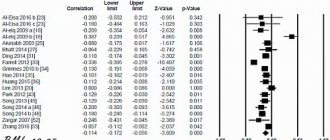Are obesity and excess weight the result of “overeating” or illness?
The content of the article
The most common reason for having extra pounds is overeating, associated with poor eating habits and “eating” emotional problems.
Much less often, it turns out that the basis of overweight or obesity is other diseases, the symptom of which is fat deposits. This group includes hormonal disorders associated with dysfunction of the thyroid gland, adrenal glands or pituitary gland, and, as a rule, polycystic ovary syndrome in women.
The harm of strict diets
Nutrition experts note that during a diet, blood pressure “jumps,” memory fails, and states of fatigue and exhaustion, increased anxiety and depression often occur. It is an unbalanced diet that causes the development of various diseases of the stomach and other organs of the digestive system, and a lack of fat leads to tooth decay. A strict diet also poses a danger to the liver and kidneys. Another unpleasant moment is that after “impact” weight loss, there is a high risk that the kilograms will return, and in triple volume. Hormonal imbalance always occurs, which is completely undesirable for absolutely all systems and organs.
Is the attitude towards overweight and obesity always stored in genes?
Environmental conditions play a key role in weight gain. The availability of all kinds of food products contributes to unhealthy eating and overeating. If you add to this a decrease in physical activity, during which you could burn a large number of calories consumed, it becomes clear where the extra pounds come from.
Many families whose members struggle with the problem of overweight and obesity from generation to generation attribute their problem to genetic factors. In reality, the problem of actual inheritance of obesity genes is much more complex and affects only a small percentage of people in the world. What we “inherit” is rather a tendency towards unhealthy eating and passive leisure.
On the other hand, there are diseases that are associated with weight gain. Their pathomechanism is based on excessive energy consumption associated with disturbances in the axes that regulate food intake or a decrease in basal metabolism, which causes difficulty in losing unnecessary pounds. Although these problems can occur in both sexes, they are more often diagnosed in women.
Hypothyroidism is a cause of weight loss problems
Hypothyroidism is actually a set of clinical symptoms that are the effect of a decrease in the amount of hormones produced by the thyroid gland: thyroxine and triiodothyronine. This, in turn, leads to a slowdown in metabolic processes, which aggravates the difficulties of losing excess weight.
Hypothyroidism
Hypothyroidism occurs approximately 5 times more often in women than in men. This is because currently the most common cause of hypothyroidism is Hashimoto's disease, which belongs to the group of autoimmune diseases, that is, those in which abnormal immune processes occurring in the body lead to the destruction of the body's cells. In the case of Hashimoto's disease, antibodies destroy thyroid cells, leading to decreased hormone production. Autoimmune diseases are more common in women, so hypothyroidism is also more associated with the fair sex.
Symptoms of hypothyroidism may include: weight gain despite no increase in food intake, chronic weakness and fatigue, decreased concentration, feeling cold, constipation and menstrual irregularities. Treatment of the pathology is based on taking the missing norms of thyroid hormones.
Thyroid condition: hypothyroidism
Hypothyroidism is a more common condition than hyperthyroidism and is more common in women than men. An underactive thyroid gland leads to decreased hormone production. As a result, the metabolic rate (metabolism) decreases, which leads to the following symptoms
- fatigue;
- weight gain;
- inability to lose weight;
- aches;
- constant feeling of cold;
- dry skin;
- hair thinning;
- fluid retention;
- weakness.
Less common symptoms include the following:
- irregular menstrual cycle;
- infertility;
- loss of libido;
- memory impairment;
- carpal tunnel syndrome.
Cushing's syndrome and body fat
Cushing's syndrome is a set of clinical symptoms caused by an excess of glucocorticosteroids, one of the hormones produced by the adrenal glands. This occurs when a patient takes too many corticosteroids or when autonomic tumors form in the adrenal cortex and secrete too much of the hormone. These types of changes are also more common in women.
Patients with Cushing's syndrome are obese with a characteristic distribution of adipose tissue predominantly in the trunk and neck, while the limbs remain slender. They also develop unsightly red-brown stretch marks around their abdomen, thighs, and buttocks. Patients with Cushing's syndrome also have a characteristic round, moon-shaped face.
As a result of Cushing's syndrome, the patient may develop serious diseases such as diabetes, hypertension and osteoporosis. Treatment of the pathology is based on taking medications that inhibit the synthesis of glucocorticoids. Then it is recommended to remove the nodule - the cause of the increase in adrenal hormone levels.
How to lose weight depending on the type of hormonal imbalance
Those who are interested in how to lose weight during hormonal imbalance need to know that weight gain, which occurs when hormones are imbalanced, differs from dietary obesity in some external signs. Fat deposits are deposited disproportionately depending on the hormone that caused the malfunction. Based on the location of fat, you can determine the cause of endocrine system disorders and take independent measures that will lead to weight loss.
Fat in the upper back and chest area
Obesity of this type can be triggered by an excess of prolactin, which is a hormone that prepares the female body for breastfeeding during pregnancy. This pathology is called hyperprolactemia and, in addition to weight gain, is accompanied by increased appetite, edema, and disrupted menstrual cycles.
If you have begun to accumulate fat deposits in the chest and upper back, and there are one or more associated pathological causes, you must be tested for the hormone prolactin before losing weight.
Obesity of this type can be provoked by certain pharmacological agents (domperidone, phenothiazine, butyrofen) or oral contraceptives. Therefore, if you are taking such medications in order to lose weight, they must be replaced with other types of medications.
Among the drugs that are prescribed to lower prolactin and get rid of excess weight, the most common is Dostinex. Many patients note rapid (1 - 2 months) normalization of weight after using this medicine.
Fat deposits in the waist area
The appearance of wrinkles at the waist may indicate an imbalance of thyroid hormones. In addition to excess weight, with this type of failure, a person feels constant fatigue, decreased performance, and lethargy. A characteristic symptom of this condition is puffy cheeks.
With this type of obesity, a special diet is prescribed that will help bring your weight back to normal. Here is a list of nutritional rules for overweight due to thyroid dysfunction:
- limiting foods rich in iodine (baked potatoes, cranberries, prunes, cod);
- emphasis on plant foods (fruits, vegetables, grains, cereals);
- inclusion of natural fiber in the diet (oat, rye and wheat bran);
- consumption of foods rich in calcium and phosphorus (dairy products, fish);
- limiting table salt to 10 grams per day;
- exclusion of refractory and cooking fats (margarine, animal fat).
The most common drugs for the treatment of weakened thyroid function and weight correction are “thiamazole” and “propicil”
Fat deposits on the thighs and buttocks
When, due to hormonal imbalance, excess weight is localized mainly in the hips and buttocks, there is a high probability that the cause is a lack of female hormones - estrogens. In addition to excess weight, this pathology is accompanied by symptoms such as mood swings, forgetfulness, and irritability. In some cases, problems with the ovaries or other organs of the reproductive system may occur.
There are products that help normalize estrogen levels and, as a result, lose weight. They must be included in the diet, without ignoring the general recommendations of a healthy diet.
Foods that will help you lose weight if you have estrogen deficiency:
- soybeans and products made from it (milk, tofu, butter);
- legumes (lentils, beans);
- flax seeds and flaxseed oil;
- coffee (drink without sugar);
- vegetables (pumpkin, carrots, cabbage).
Among the drugs that are the most common for weight correction with a lack of estrogen are Premarin, Progynova.
“I can’t lose weight” – pituitary adenomas
The symptoms of hypothyroidism or hyperadrenocorticism described above can also be caused by problems with the hypothalamus and pituitary gland. This is due to the hormonal axis “hypothalamus - pituitary gland - peripheral glands: thyroid gland, adrenal glands”. Individual hormones produced by the hypothalamus stimulate or inhibit the production of subsequent hormones by the pituitary gland, which in turn affects the production of hormones in the peripheral glands.
The most common cause of dysfunction of the hypothalamic-pituitary axis is the presence of an adenoma in the pituitary gland, which most often produces one type of pituitary hormone (in half of the cases it is prolactin). Based on their size, they are divided into microadenomas (up to 1 cm in diameter) and macroadenomas (more than 1 cm).
The presence of a microadenoma is primarily associated with symptoms of diseases caused by an excess of the hormone produced by the adenoma cells. With macroadenoma, in addition to excess hormone production, the size of the lesion itself, which grows inside the skull, is important. This can lead to headaches, visual disturbances (due to proximity to the pituitary gland and optic junction), and decreased production of other pituitary hormones due to compression of the parenchyma.
Through the above mechanisms, the presence of a pituitary tumor can lead to the development of hypothyroidism. The adenoma then compresses the remaining pituitary parenchyma and causes a disruption in the production of thyroid-stimulating hormones by the pituitary gland, which increases the production of thyroid hormones.
The symptoms and consequences of hypothyroidism have been described above. On the other hand, a pituitary adenoma may produce excessive amounts of adrenocorticotropic hormone, which in turn increases the production of adrenal glucocorticosteroids, causing hyperadrenocorticism and the symptoms of Cushing's disease, also described above.
Hormonal imbalance and excess weight - what to do?
Just from these few examples of groups of hormones, it is clear that “hormonal imbalance” is as common a phrase as “a car broke down.” And the first thing you need to do is get tested. Their results will immediately show the endocrinologist where the “skew” is and what incorrect metabolic mechanism is running. But don’t think that, for example, you will simply be prescribed injections of a hormone that you don’t have enough of, but should have more of.
Not only is this not always effective, but often such replacement therapy is destructive - the body receives a substitute without turning on the natural mechanisms for its production, and, in principle, stops producing it. So in each individual case an integrated approach is important.
Obesity and excess weight - symptoms of polycystic ovary syndrome
Unlike the above-mentioned diseases, which can also occur in men, a typical female pathology leading to the development of overweight and obesity is polycystic ovary syndrome. This disease is associated with excessive production of androgens, that is, male sex hormones, which should be secreted physiologically in women in small quantities.
Therefore, most patients experience menstrual irregularities in the form of significantly longer cycles or even amenorrhea. On the other hand, menstruation occurs much less frequently, and without ovulation during the cycles. Patients have skin symptoms associated with hyperandrogenism - male hair on the face, chest, acne and androgenetic alopecia. In addition, about half of cases are associated with overweight or obesity.
Menstrual irregularities
Endocrinologists can only treat the symptoms of PCOS, such as menstrual irregularities or skin changes. Weight loss is then recommended, as is pharmacological treatment with two-component birth control pills or drugs that reduce androgen production or inhibition. It is impossible to completely get rid of polycystic disease.
Stages of diet for hormonal imbalance
There are several sequential stages of hormonal dietary nutrition:
- The stage at which active fat burning occurs. It lasts for half a month.
- The next phase is aimed at maintaining a stable level of fat burning. Its timing is difficult to determine; it will last until the patient’s weight drops to the required level.
- The final stage is aimed at maintaining body weight at the proper level.
Why are we getting fat? – emotional disorders
Overweight and obesity can also be the result of emotional disorders. The modern world imposes a very intense lifestyle, which affects the mental state of many of us.
Food is often the salvation from everyday problems. Patients eat stress because it brings them pleasure. However, over time, addiction to unhealthy eating habits sets in, and constant late-night snacking and consuming large amounts of sweets become the norm. This regimen quickly leads to weight gain and worsens the well-being and self-esteem of patients, which contributes to further nutritional problems. A vicious circle is created.
The only way to destroy this self-propelled wheel is to contact a good endocrinologist. Unfortunately, in this case, there is no miracle treatment or surgery that can effectively get rid of the problem of overweight and obesity without drugs and physical effort.
An important condition for successful therapy: in addition to normalizing weight, the patient must restore self-esteem and learn to cope with everyday problems, getting rid of disappointment in a better way than eating.
ONLINE REGISTRATION at the DIANA clinic
You can sign up by calling the toll-free phone number 8-800-707-15-60 or filling out the contact form. In this case, we will contact you ourselves.
If you find an error, please select a piece of text and press Ctrl+Enter











